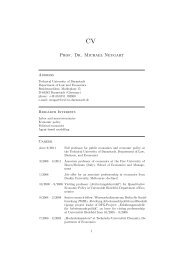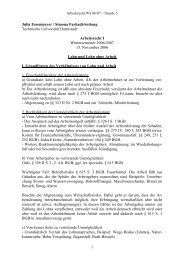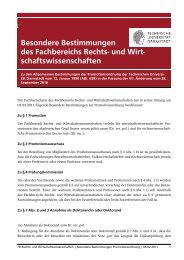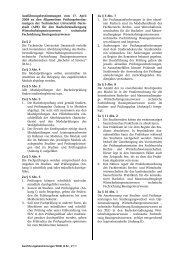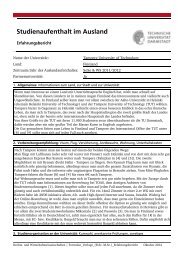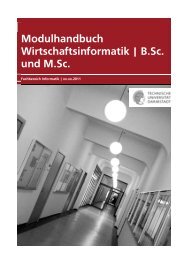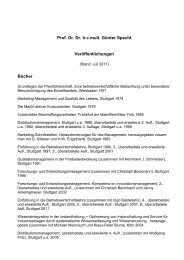Titel für - Fachbereich Rechts- und Wirtschaftswissenschaften
Titel für - Fachbereich Rechts- und Wirtschaftswissenschaften
Titel für - Fachbereich Rechts- und Wirtschaftswissenschaften
Sie wollen auch ein ePaper? Erhöhen Sie die Reichweite Ihrer Titel.
YUMPU macht aus Druck-PDFs automatisch weboptimierte ePaper, die Google liebt.
ten, sowie die speziellen Herausforderungen der Personalführung aus Sicht des Projektmanagers zu verstehen.<br />
• allgemeine Problemstellungen des Projektmanagements unabhängig von dessen Anwendungsbereichen zu<br />
verstehen.<br />
• betriebswirtschaftliche Gr<strong>und</strong>lagen der Planungs- <strong>und</strong> Entscheidungstheorie <strong>und</strong> der Investitionsrechnung<br />
auf Fragestellungen im Projektmanagement anzuwenden.<br />
• Entscheidungsprozesse im Projektmanagement, Instrumenten zur Projektauswahl, Strukturen <strong>und</strong> Instrumenten<br />
des Projektportfoliomanagements zu verstehen.<br />
• Gr<strong>und</strong>legende Einsichten in praktische Anwendungsmöglichkeiten im Projektmanagement anhand ausgewählter<br />
Beispiele zu sammeln.<br />
• Aufgaben <strong>und</strong> Schwierigkeiten, die im Zusammenhang mit der Umsetzung von IT Projekten entstehen können,<br />
zu verstehen <strong>und</strong> zu analysieren.<br />
• verschiedene Alternativen des Qualitätsmanagements zu beschreiben.<br />
• spezifische Vor- <strong>und</strong> Nachteile des Qualitätsmanagements zu verstehen <strong>und</strong> zu bewerten.<br />
•die Bedeutung <strong>und</strong> Aufgaben eines projektspezifischen Stakeholder Managements zu erkennen.<br />
Learning Outcomes:<br />
After the course the students are able to<br />
• analyze financial statements based on the German Commercial Code (HGB).<br />
• use special knowledge of Balanced Scorecard, Value Based Management and Financial Control Systems to<br />
support corporate management.<br />
• <strong>und</strong>erstand the functions and objectives of management accounting.<br />
• evaluate the benefits and limitations of the techniques of strategic management accounting.<br />
• apply techniques of strategic management accounting for strategic analyses and for the development of strategic<br />
recommendations.<br />
• <strong>und</strong>erstand the functions, objectives and challenges of quality and environmental management.<br />
• evaluate the benefits and limitations of the techniques of quality and environmental management.<br />
• <strong>und</strong>erstand the Configuration Management, i.e. the effective and efficient management of project (management)<br />
artifacts.<br />
• <strong>und</strong>erstand the terms Project, Program and Portfolio, i.e. to allow a better <strong>und</strong>erstanding of potential process<br />
environments.<br />
• <strong>und</strong>erstand Stakeholder Management and Communication, i.e. tools and techniques of this rather important<br />
factor of successful project management.<br />
• <strong>und</strong>erstand Quality Management, i.e. the aspect of quality from the project manager’s prespective and to<br />
explain general tools and techniques applied in this knowledge area.<br />
• <strong>und</strong>erstand Scope <strong>und</strong> Change Management, i.e. the definition and change of project scope and the tasks for<br />
project managers in this context.<br />
• <strong>und</strong>erstand and explain Human Resources Management in the context of Project Management, i.e. the special<br />
situation of projects as temporary organizations as well as the special role of the projects managers.<br />
• <strong>und</strong>erstand general problems in project management regardless of scope.<br />
• apply business f<strong>und</strong>amentals concerning planning and decision theory and capital budgeting in project management.<br />
• <strong>und</strong>erstand and enhance decision processes in project management, instruments for project selection, structures<br />
and instruments for project portfolio management.<br />
• get Basics of possible applications in the practice of project management using selected practical examples.<br />
• <strong>und</strong>erstand and analyse the problems in connection with IT-Project management.<br />
• describe alternative methods of quality management.<br />
• describe and value advantages and disadvantages of IT-Project management.<br />
• <strong>und</strong>erstand the importance and functions of particular stakeholder management in IT projects.<br />
Medienformen:<br />
Beamerpräsentationen, Clix, Beispielprogramme, moodle<br />
Literatur:<br />
Bilanzanalyse/Bilanzcontrolling:<br />
Küting, K., Weber, C.-P.: Die Bilanzanalyse<br />
Baetge, J., Kirsch, H.-J., Thiele, S.: Bilanzanalyse<br />
Reichmann, T.: Controlling mit Kennzahlen <strong>und</strong> Managementberichten<br />
<strong>Rechts</strong>- <strong>und</strong> <strong>Wirtschaftswissenschaften</strong> | Wirtschaftsinformatik | M.Sc. | Modulhandbuch 83



